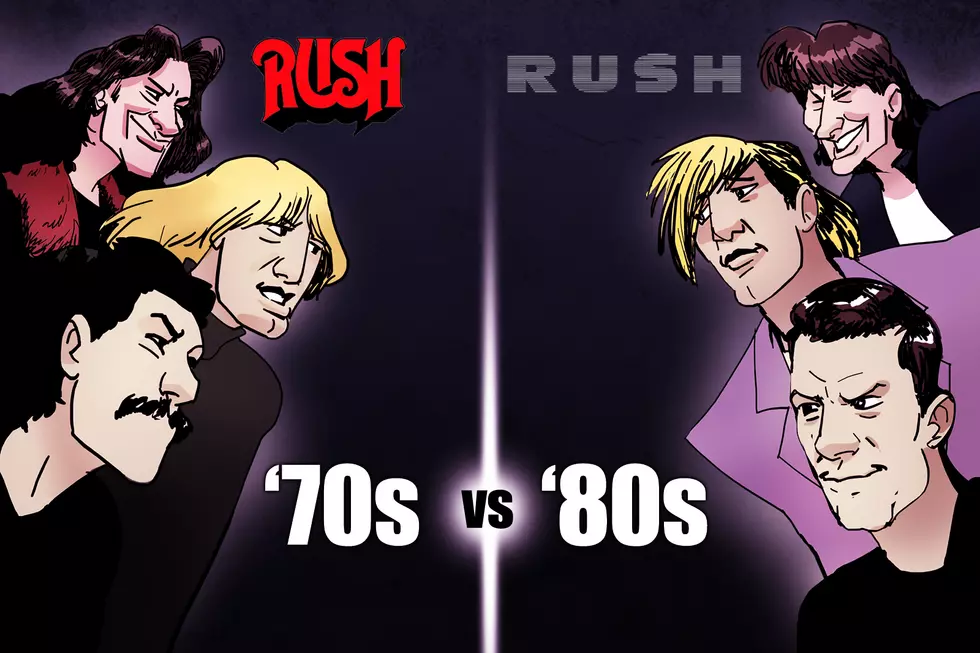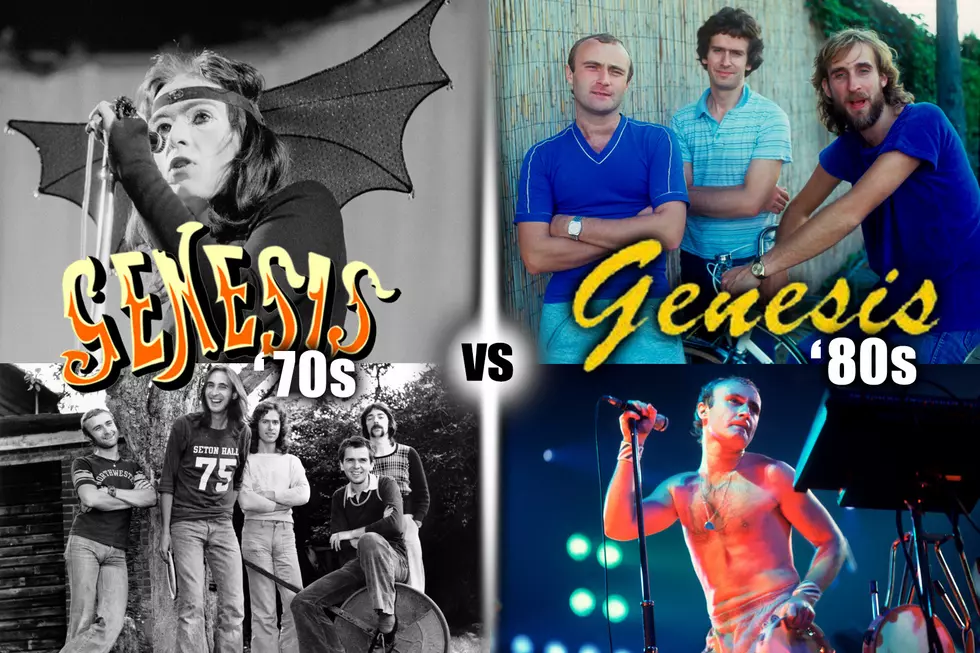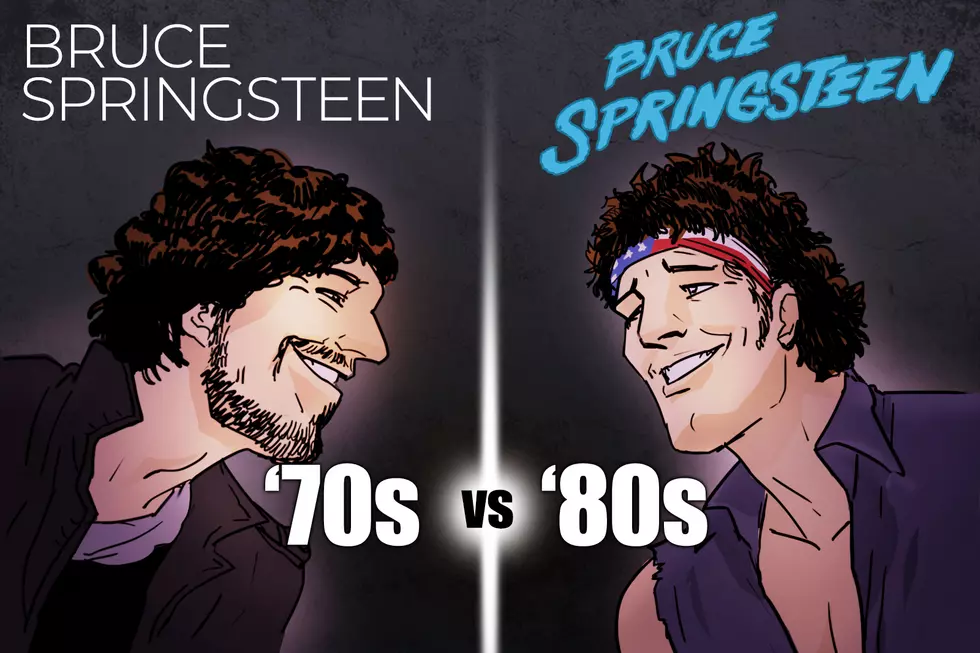
Was Rush Better in the ’70s or ’80s?: Roundtable
Which Rush is your favorite Rush? The hippie-haired power trio who crafted sci-fi narratives and complex prog-rock instrumentals in the mid-to-late '70s? The group with supremely awkward '80s haircuts who paired virtuosity with polished FM-radio choruses?
Either answer is valid. But the question is still divisive. Many fans only indulge in the band's proggiest '70s material on 2112 and Hemispheres, swearing off their music after the tracks got shorter and the synths got more intense. Others are allergic to the pre-"Tom Sawyer" era, when Neil Peart's lyrics were at their nerdiest and Geddy Lee still shrieked at glass-shattering levels.
So, let's settle this once and for all — or, really, just add to the endless debate – by tackling that age-old question: "Which Rush era reigns supreme?"
1) Were Rush better in the '70s or '80s?
Ryan Reed: This is really tough because we're essentially comparing two different bands with very different approaches. In the '70s, Rush were briefly hard rock before they went full prog, and it took them toward the end of the decade to find their footing. (I know it's blasphemy among Rush fans, but A Farewell to Kings and Hemispheres both mop the floor with 2112.) But when they reached their prog pinnacle, they ranked alongside genre's greats like Genesis, Yes, King Crimson and Gentle Giant. That creative spark lasted through the early '80s, including their transition to shorter, hookier songs on Permanent Waves and Moving Pictures. If you break down those four albums — Kings and Hemispheres vs. Waves and Pictures — it's impossible to pick a winner. So you have to look at what's left. Bottom line: They released more quality albums in the '80s — even the stuff from Alex Lifeson's "A Flock of Seagulls haircut" era. Grace Under Pressure, Power Windows, Hold Your Fire and Presto each offer a career highlight or two. It's a numbers game. (Meanwhile, their 1974 debut is a derivative dud.)
Ed Stenger, Rushisaband.com: Comparing Rush from one decade to the next is a completely subjective exercise, so it’s tough for me to say whether they were “better” in the ‘70s or ‘80s, but I will say that they were definitely different. I prefer the ‘70s era just because it’s where I cut my teeth with Rush, so those albums will always hold a special place for me. The evolution of the band was dramatic from album to album in the ‘70s, especially between the debut and Fly by Night, and between Hemispheres and Permanent Waves. So, in the sense of their progression as a band and the development of their sound, the ‘70s were certainly a more exciting and eventful time for Rush. Permanent Waves was their goodbye to the uber-progressive, side-long epics and paved the way for the keyboard-laden ‘80s. Those ‘80s albums have a more consistent, polished edge to them, but those couldn’t have happened without that hyper-evolution that occurred with their ‘70s material. The ‘70s were analogous to the band’s adolescence and the ‘80s their young adulthood. Both were great eras in their own right, but the ‘70s were definitely more important for the development of Rush’s musical identity and iconic sound.
Matt Wardlaw: The '70s found Rush developing and evolving as a band, with the world listening in on each record. They were already a sophisticated unit musically, even with the songs on their debut. But the albums they released throughout the rest of the decade saw them continue to hone in on their individual and collective strengths as musicians and as a group. I would give a slight edge to their work in the '80s, because they really took advantage of what they had learned from the time spent in the studio and on the road in the '70s. They married that found knowledge with the opportunities that technology presented in the '80s and used that combination of elements to turn out albums and songs that remain extremely compelling.
Michael Christopher: The Rush of the '70s, though still obviously finding their way at points, had an energy that was undeniable. That enthusiasm allowed them to do eight-minute-plus songs like “By-Tor and the Snow Dog,” “Xanadu” and the epic title track to 2112 that never really felt meandering. Very few bands from that period could say the same. And when they weren’t stretching out musically, or the track didn’t need much space to breathe, they offered a packed-in ferocity that stands up against some of the best hard rock of the decade. There are the obvious examples like “Fly by Night,” but dig deeper into something like “Need Some Love” from the 1974 debut. While maybe not the most lyrically poetic or musically flashy, you’ll discover just over two minutes of intense, unbridled fun.
2) Were the addition of keyboards and the move to shorter, punchier songs a good or bad thing?
Reed: Good on all counts. Every band, particularly a "progressive" band, needs to evolve. Rush were already experimenting with synthesizers in the late '70s, so it's not like they suddenly added a harp player the following decade — they just used the instrument more as a foundational compositional tool, rather than an ornamental one. And it's not like they lost their chops: Geddy Lee and Neil Peart remained the sharpest rock rhythm section on the planet. That happened to dovetail with their shift toward tighter, shorter songs. After the elaborately constructed Hemispheres, they couldn't possibly get any proggier, so they started writing actual choruses. Can anyone be unhappy with a shift toward "Tom Sawyer" and "The Spirit of Radio"?
Stenger: Although I still prefer the guitar-heavy, “proggy” Rush of the ‘70s, the move to shorter, punchier songs in the ‘80s was ultimately a good thing for Rush because it allowed them to stay relevant as a band and to continue their evolution. There’s no doubt that they lost some fans along the way with the addition of keyboards and their distancing from progginess, but — more importantly — they gained many new fans by making those same changes. So, their fan base evolved right along with their sound — unlike many of their ‘70s rocker peers, most of whom never changed much and ultimately became irrelevant, banished to playing shows at rib fests, state fairs and on cruise ships to their aging and ever-shrinking fan base. Rush actually went the opposite direction, continually replenishing their audience with younger fans while retaining most of their old-school followers. When they finally retired last decade, they went out at the peak of their relevance and popularity due to their willingness to truly progress over the decades rather than stagnate in their ‘70s roots. Ironically, their last few albums saw them return more to that guitar-driven sound, but with a markedly more polished result due to their prior explorations of other genres and instruments in the ‘80s and ‘90s.
Wardlaw: I think it was a good thing and a natural progression. Musical history has shown us that musicians are always going to play with the new toys that are around. In this case, as keyboards and synths became more of a thing in the '80s, Rush embraced that trend and put it into play with the music that they were creating. The fact that the songs were also shorter, I think, was at least partially because of the heavy road work up to that point. They had a better handle on how the individual pieces of the machine worked and were able to concisely channel the best parts.
Christopher: It was a great thing. Unlike a lot of artists in the '80s, Rush added keyboards not as a necessity to keep up with the shifting times but because they were naturally developing and found an avenue to enrich their music. It’s the main reason why those years are looked back on so fondly — because it doesn’t come off as dated or temporary, but rather intrinsic to the overall trajectory of the band’s evolution. And the fact that they became proggier while shortening the songs is a feat in itself that remains mind-boggling in the best manner possible.
3) What's the most underrated Rush album from each of these two decades?
Reed: For the '70s, it's definitely Caress of Steel. Okay, any album that includes "I Think I'm Going Bald" can't be a masterpiece, but critics — and even, on occasion, the band members themselves — have dismissed the album as some kind of bloated artifact from the glory days of prog. There are some heavyweight moments here, particularly the majestic "Lakeside Park" and "Bastille Day." For the '80s, it's hard to choose between Hold Your Fire and Presto, but I'm going with the latter. Arriving in 1989, just before the band's soggy stretch of the early '90s, Presto pivoted away from synths back to a guitar-heavy sound. But even at its riff-iest ("Show Don't Tell"), the album still offers a soothing wisdom – like on the poignant "The Pass," on which Neil Peart tackles teenage suicide.
Stenger: Caress of Steel is without question Rush’s most underrated album of the ‘70s. As whimsical as it was, the songwriting was solid; there are some great melodies in “Fountain of Lamneth,” despite it being a bit disjointed. “The Necromancer” is a fun, Tolkien-esque romp, and “Bastille Day” is up there as one of their strongest album openers from that era — not to mention “Lakeside Park." Most importantly, the "mistakes" made on that album paved the way for 2112 and everything beyond. Rush’s most underrated ‘80s album is probably Hold Your Fire. It’s often listed among fans’ “least favorite” Rush albums, likely due to its “poppy” sound and overuse of synths; it’s probably the peak of Rush’s synth era. Despite that, the songwriting is sound, with “Time Stand Still” being one of Rush’s most powerful tracks from that era – or any era. “Force Ten” and “Mission” also stand out and stack up well against Rush’s many other ‘80s-era compositions.
Wardlaw: It's hard to look at any of the '70s albums as being underrated. But 1975's Caress of Steel is probably the closest from their work in that decade. The group made their official move into a more progressive area, and it didn't perform as well as the previous two albums — and in that sense, it didn't enjoy as much of the "limelight" as other albums in the catalog. When it comes to the '80s, it feels like 1987's Hold Your Fire gets a bit lost. That's unfortunate, because it finds the band in a good spot, opening on an energetic note with "Force Ten." At a time when some '70s legacy bands were struggling to stay above the water, releasing albums that really felt lethargic or awkwardly placed, Rush were staring straight into the "eye of the storm" and pushing forward with some of their strongest work.
Christopher: The self-titled debut album gets passed over quite a bit either because it sticks out musically like the proverbial sore thumb from the rest of their catalog, or because it’s the only LP not to feature Neil Peart. Those reasons might be fair, but Rush is criminally underrated as a standalone work. Amid the overused — though entirely understandable — comparisons to Led Zeppelin, “Finding My Way” is a brilliant opener, and “What You’re Doing” has a riff that’s borderline stoner-rock. Meanwhile, why does 1989’s Presto get overlooked so much? The album is notably transitory, moving out of the reliance on keyboards and leaning more on guitar-oriented compositions, yet that doesn’t negate some standout and just plain interesting moments. Looking at the bigger picture, the dislike of Presto is understandable because fans had gotten used to one way the band sounded, and the new approach didn’t go back or move forward but sort of veered. Still, “Superconductor” flat-out rocks, and deeper cuts like “Chain Lightning” have an early '90s sheen that somehow manages to sound fresh even today.
4) Were Rush better live in the '70s or '80s – or even the 90s or later? If you could time travel to any one tour, which would it be?
Reed: Rush were the rare prog band that harnessed more control over its instruments as time went on. I wouldn't argue someone who selected the '90s or beyond for this answer. But I'd have to go with the '80s for a couple reasons: Lee's voice had matured beyond its initial untamed shriek into a more expressive, nuanced device. And by this point, they had a more varied catalog to draw from, meaning I could hear more streamlined songs like "Red Barchetta" alongside some of the earlier prog pieces. I'd probably time travel to the Moving Pictures tour, for no other reason than it's (probably) my favorite Rush album.
Stenger: I’ve seen every tour since Power Windows, but I never was lucky enough to see Rush live in the ‘70s. So for that era, I can only go by old concert footage and secondhand reports. That said, I can honestly say that they became progressively better each tour, and the R40 Live tour was hands-down their best. When they began the “evening with Rush” format in the late ‘90s (where they played close to three hours with no opener) is when they really took things up a notch with fans getting a “two for one” deal with every show. They also started incorporating more in-concert videos and stage props around that time, which just added to an already fantastic concert experience. So, just those facts alone make the shows from the last two decades really stand out in quality. Also, even with how good they were on their instruments to begin with, their technical prowess and skill just kept getting better with every tour. They certainly went out on a high note. All that said, if I could time travel back to see any one tour, it would definitely be 2112; it would have been a really unique experience to see them at that raw stage of their career when they were just about to break wide open. I still envy folks who saw them back then.
Wardlaw: I feel like Rush played some of their best concerts in the last half of their career, with the Time Machine tour of 2010-2011 being one particular high point. From a set-list standpoint, that trek and the subsequent Clockwork Angels and R40 tours showed their keen focus on staging a new and different experience for the fans, highlighting material that hadn't been played previously or had rarely featured. So many groups slip into the phase of "greatest hits" tours over and over to ride out the remainder of their career. Rush, as they did with so many of their career moves, handled things differently — and the fans got to see some really special shows and moments as a result. As far as the time-travel aspect? It would be tempting to travel back to many of the tours in the '80s. But personally, I'd have to choose the Counterparts tour — I have a lot of regret for missing that one. While it's documented in part on the Different Stages release, I have hope that they'll release a full show from that tour one of these days.
Christopher: There might not have been a better Rush tour song-wise than their final one, R40 Live in 2015. Rarely does a band get to go out after that many decades and blow their audiences away with both the content of the set lists and musicianship behind it. Any other tour would be potentially bogged down by the work that was being promoted at the time. Going back in time, I’d want one more chance to see them in the spring or summer of 2015.
5) How would you sum up Rush in the '90s and '00s? And how do those decades compare to the '70s and '80s?
Reed: One of my friends, a fellow music journalist and Rush fan whose opinions I dearly respect, considers the '90s one of the band's high points. What a dummy. There are solid songs here and there on their three LPs of the era, but there are also some cringe-worthy moments. (Lee's "rapping" on "Roll the Bones" is enough to discredit the entire decade.) Thankfully, the band rebounded for its final stretch, saving some career highlights for 2007's Snakes & Arrows and 2012's Clockwork Angels. For me, the '00s were closest in spirit to the early '80s in balancing melodic verse-chorus songs with their usual virtuosity.
Stenger: Rush’s career in the ‘90s and ‘00s was a bit tumultuous and disjointed through no fault of their own, really. The ‘90s were, in my opinion, the least interesting phase of the band. The three releases of that period (Roll the Bones, Counterparts, Test for Echo) were solid rock albums, but noticeably lacking compared to their other material both before and after. The ‘70s and ‘80s were a prolific and eventful time for Rush, but they stagnated a little comparison in the ‘90s. That was probably due to them just maturing as human beings and settling into a groove as musicians. Even though they had tragic reasons for their long hiatus in the late '90s and early '00s, I think that time away was good for Rush musically. That rebirth of the band in the early ‘00s sparked a renewed creativity. Vapor Trails was raw and had its issues, but the songwriting was strong and you could see the band returning to its guitar-heavy roots. That album was necessary for them to shake the rust off and ultimately brought us two masterpieces in Snakes & Arrows and, especially, Clockwork Angels.
Wardlaw: When grunge and other musical styles emerged in the '90s, it ended up being a career-killer for some groups. Rush responded by making Counterparts, a harder-edged record that pulled in some sonic influences from that time. That was the last time in their career where it felt like they were trying to fit in with current trends — and one could argue that they were always making music on their own terms, not worrying about fitting into the landscape of what was perceived to be relevant. They made a lot of great music in those final years and decades: Clockwork Angels, in particular, deserves more acclaim than it receives. Whether or not they knew at that time that it would be the final Rush studio album they'd make together, it ultimately ends their run on a really high note. How do those last few decades stack up with what they did in the '70s and '80s? I don't think there's much to compare — it's all one long and really fascinating road that we were lucky enough to travel as fans. In each era, they were experimenting and pushing their creative boundaries farther and farther out. I don't think they ever stopped trying to find new paths as a group, and that's admirable.
Christopher: Desperately trying to find the best of both worlds is the proper way to describe '90s and '00s Rush. There was this deeply ingrained fan base that loved either the '70s, the '80s or both equally, and the band’s own intent to please both while staying true to their need as musicians to grow. It would be unfair to put it in black-and-white terms, given the band's desire to build upon the past into a sound that would satisfy themselves and their audience. Ultimately, Rush achieved the typically impossible act of progressing without disappointing — one more reason why they remain legends.
Final Albums: 41 of Rock's Most Memorable Farewells
You Think You Know Rush?




